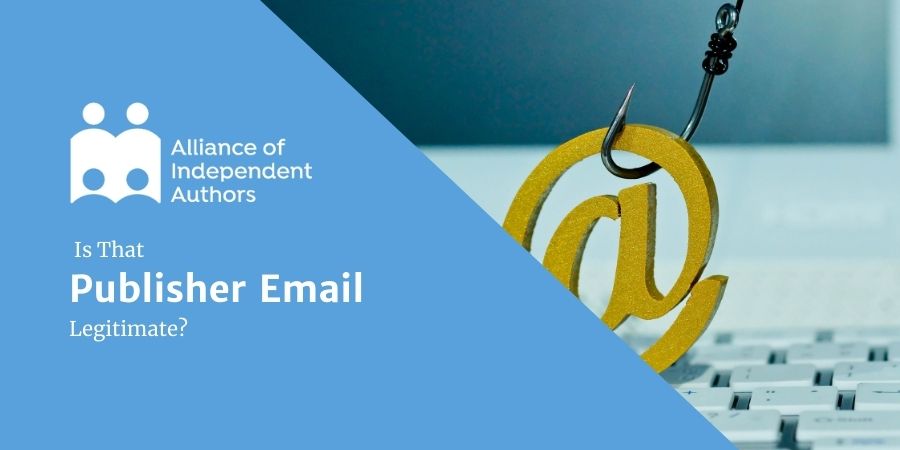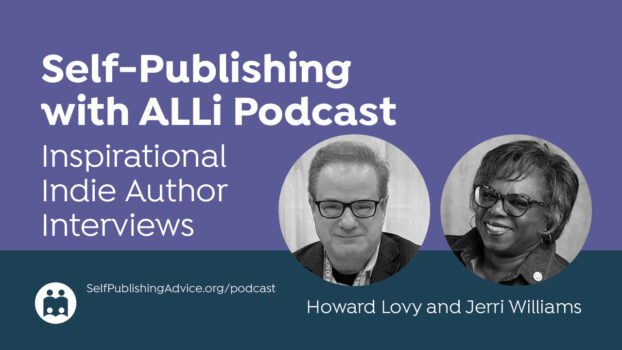We're sensible indie authors, we can often sniff a scam out. But scammers are getting smarter and it's getting harder to tell a legitimate email from a scam. In today's Alliance of Independent Authors Watchdog post, John Doppler explains how to tell the legitimate from the scam.

ALLi's Watchdog John Doppler
Your book has been on the market for a few months now, and maybe sales are starting to lag. Then one morning, you open your inbox, and a wondrous email springs forth with a fanfare of trumpets:
Greetings!
This is Joseph Monicker from Reputable Press Solutions, a traditional global publisher affiliated with Penguin Random House.
We are very interested in the book that you published and we would like to help you get a contract from one of the biggest traditional publishing companies…
Because you are a wise author, you immediately suspect a scam. But how can you know for sure? Are you passing up a once-in-a-lifetime opportunity?
The Lure of the Possible
That's the kind of doubt scammers rely on: vague suspicion, coupled with the hope that an offer is authentic. And if they can allay those suspicions, the remaining optimism enables them to drag authors down to ruinous losses. We want to believe that a publisher is interested in our books, and so the scammer's job is halfway done the moment their solicitation lands in your inbox.
Successful Publishers Are Not Searching for Your Book
Right from the go, be aware that legitimate publishers do not trawl authors' email and blogs for submissions. A successful publisher will have more submissions than they can handle, especially a well-known traditional publisher. They don't need to sift through bookstores and blogs looking for undiscovered gems; they can comfortably sit back and wait for authors' agents to bring a parade of potential best sellers straight to their doorstep.
When you receive an email claiming to be from a famous publisher or an agency that claims to have pitched your book or received interest from a major publisher, that's certain to be a lie.
Has This Company Been Documented?
The first stop in your research should be a search for the company name. Our service ratings identify hundreds of the best and worst companies, so start by searching for the name of the publisher or agent.
You'll also find a huge and wonderfully detailed list of offenders at Writer Beware. A Google search for the company name plus “complaints”, “reviews”, and “scam” may be helpful in turning up additional information.
And if you can't find anything about the company, that in itself is a major warning sign. If this company is successful at what they do, why isn't there more information about them on the internet, good or bad?
Who Is Sending the Email?
Take a look at the email address of the sender. If it's a Gmail address, Yahoo address, or other free email service, that's spam. Professional, multi-million dollar companies do not rely on free email services when they have an authentic, identifiable domain of their own.
Also be on the look out for lookalike addresses that mimic real companies' domains. Maybe the email comes from penguin-random-house-publishing.com, but the actual domain for PRH is penguinrandomhouse.com. Look up the real domain for the company, and if the alleged publisher email comes from another domain, be suspicious.
Another common tactic is to create a subdomain on an unrelated domain. For example, the email might come from penguinrandomhouse.scammer-website.com. The important part of a domain name is the part that comes immediately before .com, .net, .org, etc. In this case, the email is coming from “scammer-website.com”, regardless of what appears before that.
It's important to keep in mind that email addresses can be faked (or “spoofed”, in cybersecurity parlance), so even an authentic-seeming email address is not a guarantee that the sender is legitimate.
Watch That Language
Take note of grammatical and spelling errors, awkward phrasing, and other indicators that the author is not skilled in English. A publisher that publishes English language works to an English-speaking audience is not going to entrust their outreach to someone who is not very fluent in the language.
Publishing scams tend to gravitate to jurisdictions where there are few consumer protection laws, or lax enforcement of them. In recent years, the Philippines have become one prominent locus for these scams, with a staggering number of fraudulent companies and aliases operating out that region. Poor English is often a giveaway that the company is operating overseas.
One notable exception to this is companies seeking foreign translation rights; obviously, these companies will be headquartered in the regions they represent, and those are likely not English-speaking nations. For more information on evaluating overseas publishers, see this useful article from the ALLi team.
Who Else Is Being Solicited with the Same Pitch?
Grab a section of text from the email, such as the introduction, and plug it into Google with quotation marks around it. If that same solicitation appears in the comments of authors' blogs, then the sender is probably spamming any author they can find — and you're just a potential mark to them. This is especially true when a wide range of genres are being targeted.
Learn more about literary impersonators and a current, prolific scam in this excellent analysis from Writer Beware.
Skepticism Is Essential
Optimism is the hook that enables scammers to snare their victims, and skepticism is what allows authors to escape that trap. In an industry swarming with predators, thieves, and simple incompetence, it's essential that authors remain skeptical of any offer. Time and time again, I've seen authors who wouldn't reply to an email from a supposed Nigerian prince eagerly leap at an offer that's no more credible, simply because it has purports to be from a publisher.
If it seems too good to be true, it probably is.





I self-published my second novel, Shadows Over an African Heart, in 2018 with Outskirts Press. Each year they are billing me US$30.00 for Annual Distribution Subscription Fees. Is this a usual payment expected of authors? I would appreciate your advice.
Regarding a separate matter, do you accept reports from authors about blatant scams they are confronted with? If so, where do I send them?
Thank you.
Diana M. Hawkins, Lawrenceville, GA USA.
If an individual (ME) has been subjected to unspeakable documented complaints of gross, “IDENTITY THEFT” since August 1993; and for the past nearly 3 years is continuing receiving email payment notices from a DIGITAL PUBLISHING company in which they have never heard of the company nor received any of the payments< what should the individual do?
Sincerely,
Ruth Craft
I am looking to find information about
kindlepublishersinc.com
Thank you!
Amy